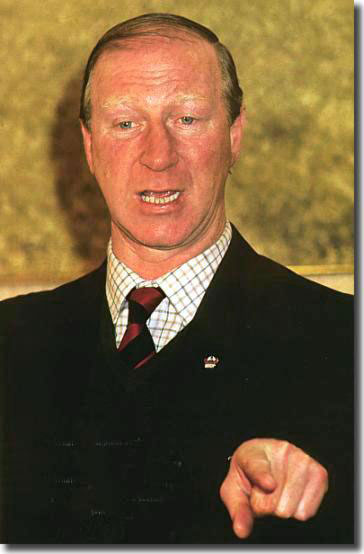 Part 1 The early years - Part
2 1966 and all that - Part 3 Indian summer
- Part 4 Football manager
Part 1 The early years - Part
2 1966 and all that - Part 3 Indian summer
- Part 4 Football manager
After 35 years in football and 12 in club management, Jack Charlton spent
the autumn of 1985 in his favourite pursuits of hunting, shooting and
fishing and generally enjoying life. Then in December 1985 Des Casey,
President of the Football Association of Ireland, rang out of the blue
to take him on.
Charlton: 'I like Ireland. I like the Irish people, I like a pint of
Guinness, I like the craic. I like the fishing in Ireland - in fact, I
like it so much that I've bought a house on the west coast there with
a friend, to serve as a base when we go fishing. And I wanted to be an
international team manager. If the Welsh had offered me the job, or the
Scots, or even the English, I'd have taken it, because I felt that's what
I wanted to do. So, yes, of course I was interested.'
Ireland had a lot of good players to call on at the time, although
they had never managed to do anything of note at international level.
He could pick from the Arsenal trio Frank Stapleton, David O'Leary and
Liam Brady, Mark Lawrenson and Ronnie Whelan of Liverpool, Manchester
United's Paul McGrath and Kevin Moran, without even mentioning John
Sheridan (Leeds), Ray Houghton, John Aldridge (both Oxford), Packie
Bonner, Chris Morris, Mick McCarthy (all Celtic) and many others. These
were world class players, but they just could not get their act together
as a unit.
'I informed them I didn't want a contract. I would stay for three years,
which would take us through the 1988 European Championship and into the
qualifying rounds for the 1990 World Cup. If either party was dissatisfied
at that point, the agreement would end with a handshake.
'My first game in charge of the Ireland team - a friendly against Wales
at Lansdowne Road in March 1986 - was notable for three things. Ian Rush
got the only goal for Wales, their goalkeeper Neville Southall got a broken
ankle, and I got a reputation for forgetting the names of my own players.
'It's possible that I may have called Liam Brady Ian on a couple of occasions.
I was stuck with this reputation for forgetfulness. And it became a bit
of a party piece with me. Announcing the Irish team to the press after
training, I'd go, "Bonner, Morris, Houghton, Moran - and that big
lad, what d'you call him ..." and someone would prompt me - "McCarthy!"
- without realising that I was taking the mickey yet again.
'Anyway, our next fixture was against Uruguay which we drew 1-1, and
then ... nothing.
'I needed a few games to sort out the team before we started our qualifying
programme for the European Championship just four months later - but when
I talked with the FAI, I couldn't believe how disorganised they had been.
They told me we might be going on tour to South America, there was a possibility
of a tournament in Iceland, or there might even be a game in Europe. This
was in the late spring, the last realistic chance to get the players together
before the end of the football season!
'In the event, we went to Reykjavik for a three-nation tournament involving
Iceland, Czechoslovakia and ourselves. By the time we got ready to go
to Iceland, I'd already determined which way we would play. My philosophy
of football is that it is better to do simple things well, rather than
get involved in complicated patterns which are foreign to our game. At
the time, most European teams were playing a sweeper system, with the
spare man working the ball from the back to midfield, 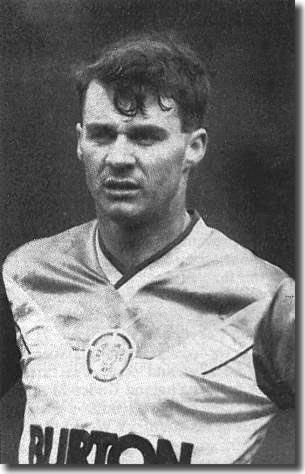 with
the primary aim of getting their playmaker free.
with
the primary aim of getting their playmaker free.
'We couldn't operate like that, not because we didn't have the players,
but because most of our players played in England, and the British 4-4-2
style of game was fundamentally different in its concept. Here the primary
aim was to get the ball into the box at the earliest opportunity, and
the best player in the team wasn't always the guy who played in central
midfield.
'If our midfielders had the ball, they gave it to the full-backs. They
would then drop off as far as they liked, before delivering the ball into
the corners behind the opposing full-backs, and immediately we'd push
forward to condense the area. John Aldridge would be on his way into the
corner for the ball even as it was struck and almost by definition, his
marker followed him.
'That meant that one of their three centre-backs was already drawn out
of position and a space opened up in front of goal. If Aldo got there
first, Ray Houghton would push up to support him - but I would say to
John, "Don't worry if the centre-back gets to it first, just stay
on top of him. That way he has to play the ball out of the corner and
if we've enough bodies in there, he'll find it difficult."
'When John won the ball, our other front runner Frank Stapleton would
go to the back post, a midfielder, Paul McGrath or Mark Lawrenson, would
take the near post, and now we had people in position to converge on the
cross when it came in.
'The vogue in Europe at the time was that every one of the outfield players
should use the ball constructively. That was fine as long as nobody pressurised
them, but we were about to do just that, and the effect was immediate.
Suddenly, the elegance disappeared and the assured defenders I had seen
on television now began to look a lot less composed.
back to top
'The tenets of our game plan were as simple and as basic as that. So
simple, in fact, that the opposition couldn't handle them. And when they
eventually stumbled on the answer many years later, it was more by accident
than design.' The tactics worked well in that tournament and Ireland saw
off both Iceland and Czechoslovakia, convincing Charlton that he was on
the right track.
The World Cup finals in Mexico in 1986 reinforced Jack's belief that
the only way Ireland could hope to make an impact was by imposing their
kind of pressurised football on their opponents. He covered the finals
for ITV, and used the opportunity to run the rule over three of Ireland's
European Championship opponents, Scotland, Belgium and Bulgaria.
The opener for the Irish was in Belgium's Heysel Stadium, the first big
game to be played there since the European Cup Final disaster a year before.
Ireland came away with a 2-2 draw but also a very disillusioned Liam Brady,
whom Jack had asked to play a very different game from his normal one.
The new style Ireland had adopted demanded that Brady should spend a lot
of the time pressing the Belgian full-back. He did, however, manage to
score one of the goals in a 2-2 draw.
A 0-0 home draw against Scotland followed, and in the return the Irish
pinched it with an opportunist goal from Mark Lawrenson.
A 2-1 defeat in Bulgaria was a setback, and it was mainly due to bad
refereeing decisions which contributed to both Bulgarian goals, including
a dubious penalty award. The Bulgarian centre forward Sirakov had been
instrumental in conning the ref on both occasions and he was targeted
for revenge in the return match. When another point was dropped in a scoreless
home draw with Belgium, it looked like the wheels were starting to come
off. Two close victories over Luxembourg steadied things somewhat, but
the Irish were pretty fortunate on both occasions.
'And so on to the big one, the return with Bulgaria. This was the one
we had to win, and we did - thanks to second half goals from Paul McGrath
and Kevin Moran. And Mr Sirakov? He got his come-uppance, too, but all
within the rules, you'll understand.
'That was a day when quality and passion came together in an unbeatable
formula. Brady was brilliant, just brilliant. He was playing off the front
two, taking on defenders, going to them when they had the ball, doing
everything I had entreated of him for more than a year. I remember turning
to Maurice Setters and remarking, "The penny has dropped."
'And then this gifted man, who can calculate a pass to the last roll
of the ball, goes and destroys it all. We're leading 2-0, there's only
a couple of minutes left, and as he turns away from an opponent with the
ball, he's kicked. What does he do? He spins around and kicks the guy
back, straight in front of the referee. Off! My heart sinks. Whatever
happens now, whether we get to the finals or not, he's going to pick up
a minimum two-match suspension.
'With just one team to qualify from Group 7, it was now all down to Scotland's
ability to beat Bulgaria in the last game in Sofia to get us through.
A draw would be good enough to qualify the Bulgarians on goal difference,
and to be honest, I reckoned that was the very least they would get. Not
only were they a good technical team when playing at home, but the Scots,
already out of contention, had nothing but their self-respect to play
for.'
Jack spent the day of the game shooting with a friend in Shrewsbury and
then watched the match on television. With the game still scoreless Charlton
received a phone call saying that Scotland had won and the Irish were
through. He thought it was a wind-up but the television transmission was
a delayed one and the Irish had made it into the finals of a major championship
for the first time. However, they had to play without both Mark Lawrenson
and Liam Brady who dropped out through bad injuries.
The first game of the Finals was against England, and Charlton was shocked
about exactly how much the match meant to Ireland.
'They had once beaten England at Goodison Park, but that was almost forty
years earlier. I discovered that they still talked about that win when
I first became involved with the FAI, but for a whole generation of Irish
people, victory over the English was something they had only read about
in history books.
'Against that background, the build-up to the game in Stuttgart was exceptional.
Most of the English players had been in action in the World Cup Finals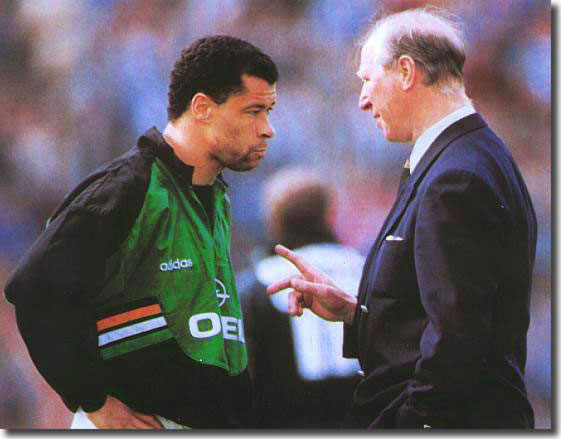 in Mexico two years earlier and, as such, Germany was no big deal for
them.
in Mexico two years earlier and, as such, Germany was no big deal for
them.
'We, of course, were in a different situation. It was all new territory
for us, and my biggest job in the days before the game was to try to take
the pressure off the players and get them relaxed. Some of our training
sessions were so laid-back that they must have sent reassuring messages
to my old friend, Bobby Robson, in the England camp. And that suited me
just fine.
'The one thing that bothered me about Bobby's team was that he played
two specialist wingers, Chris Waddle and John Barnes. Given any kind of
latitude, I knew they could destroy us, so I decided to modify our game
plan just for this one occasion.
'Usually, we pressurised people, got on top of them as soon as they had
the ball. But not this time. I told the lads, "Move towards their
back four when they have it, make them feel comfortable on the ball but
not comfortable enough to look up and deliver it. Get close enough to
persuade them that, far from delivering the wide ball, their best option
is to play it across the back four." That way, their build-up from
the back would become even slower, the wingers would be forced to drop
back to take the ball, and we would then be able to handle them better.
It worked like a treat. Their two full-backs, Gary Stevens and Kenny Sansom,
could never get Waddle and Barnes into the game, and eventually the wingers
ended up having to come back to the halfway line for any scrap of possession.
'Ray Houghton had given us the lead after only a couple of minutes, and
it wasn't until relatively late in the game that they got us into any
kind of trouble. And that was down directly to the fact that Bobby introduced
Glenn Hoddle to his team on the hour.
'He had set out to beat us by playing through the middle, gradually realised
it was getting him nowhere, and then brought on Glenn to start dropping
balls over our back four from midfield. Thank God he didn't do it earlier.
We struggled to contain the new situation - and Gary Lineker in particular
- and but for a couple of marvellous saves by Packie Bonner, we might
well have lost the game. But we didn't, we won it. We'd done what we'd
set out to do, and given Ireland the win the country demanded.
back to top
'The night of the England game, we celebrated suitably. We also introduced
a new word to the players - curfew. Some of them wanted to know if it
meant a flightless, long-beaked bird, but they got the message soon enough.
We'd another big game coming up against the Soviet Union in Hanover three
days later and we needed the batteries recharged.'
Changes were needed for that game because of an injury to Paul McGrath
and players had to adapt, but 'the new formation fitted like a glove ,
and the 1-1 scoreline at the finish did not do justice to the way we played.
It was probably as good a performance as any Ireland had produced away
from home. The memorable points for me were Ronnie Whelan's strike, the
goal we gave away, and the reaction of the Soviet manager after the game.
In every respect other than the scoreline, we had won hands down - and
the Soviet manager knew it. A couple of days earlier, he had done what
he probably considered the hard bit by beating the Dutch. Now, he knew
more than most that his team had been second best against us. He shook
hands without even looking at me, but I'd never seen a more disappointed,
down-in-the-mouth expression on the face of any manager in my life.
'The result meant that we now needed only a point from our last game
against Holland at Gelsenkirchen to reach the semi-finals. With 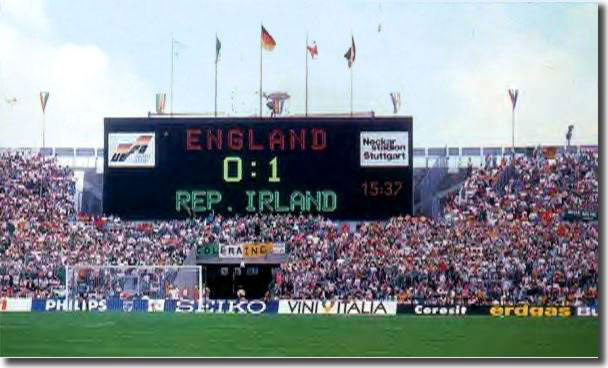 Paul
McGrath fit for action again, I was pretty confident we'd get it. That
was until we got to the stadium on match day and discovered that the temperature
was in the high nineties for the afternoon kick-off.
Paul
McGrath fit for action again, I was pretty confident we'd get it. That
was until we got to the stadium on match day and discovered that the temperature
was in the high nineties for the afternoon kick-off.
'Ours was a pressure style, involving an inordinate amount of running.
After two hard games in the preceding six days, I feared that legs would
go in that kind of heat. To combat it, we devised a plan under which the
ball would be played back to Bonner at every opportunity. He would then
hold it and bounce it for ten to fifteen seconds, giving our players a
brief respite. What Packie was doing was perfectly legal. There was no
rule in the book which prohibited a keeper from bouncing the ball. But
I noticed the referee was getting increasingly annoyed with him in the
second half and I feared that he was about to lose his patience. The plan,
regrettably, had to be ditched - and with it went our chance of getting
to the last four. Now there were no rest periods, everybody had to chase
and run, and suddenly the Dutch were in control of a game in which we
had gone closest to scoring with McGrath's header against a post. But
with only seven minutes to go, we were still holding them, when disaster
struck.
'Ronald Koeman's mishit shot looked to be going well wide until Wim Kieft,
only in the game as a replacement, got his head to it, and the ball, getting
something akin to a leg break in cricket, sneaked in at the far post.
'Of all the ways to lose a game! We had competed like Spartans for three
games, played well enough to have won all three, and yet we were out of
the championship - all because of the biggest fluke of the year.'
The qualifying competition for the 1990 World Cup pitted Ireland against
Northern Ireland, which was potentially a highly sensitive political situation.
The first game was at Windsor Park in Belfast and Jack had to put up with
some insults from the crowd.
'I just smiled at the hostile supporters and when I put my head through
the wire barrier and asked one of them for a light, I think it helped
defuse the situation marginally. In fact, there wasn't much in the game
to match their passion. It was tough and tense, just like an English club
derby. We probably had the edge in scoring chances, but it still took
a couple of good saves by Gerry Peyton, deputising in goal for Packie
Bonner, to earn us a point from a scoreless draw.
'Apart from Northern Ireland, Spain and Hungary were the danger teams
in the group, and when the meeting to arrange dates and venues for the
games was held earlier in the year, I took a calculated risk. I decided
to open our programme by playing the three hardest games away from home,
in the hope that the competition wouldn't yet have developed a fine edge
at that point.'
The gamble looked like it had backfired when a below-strength Irish side
lost 2-0 to Spain in Seville - they were taken apart.
'Fortunately, we had a full-strength squad when we went to Budapest for
our next game, but in spite of dominating the Hungarians, we still had
to content ourselves with just one point from a scoreless draw. A couple
of years earlier, a draw in Hungary would have been interpreted as a smashing
result. Now the Irish press were complaining that we didn't take our chances
and that we should have won the game! I agreed with that assessment, but
the criticism served to remind me that expectation in Ireland was now
reaching a disturbing level.
'Still, that was the price of the job I'd taken on board - and when we
met Spain in Dublin in April 1989, I knew that our margin of error was
zero. This was the game we had to win to stay competitive in the group,
and the fact that the Spaniards had made our improvised team look so inadequate
in Seville had the effect of focussing minds. They'd had their hour of
glory. Now it was time for us to show them that, with a full-strength
side, they were only second best.
'We did what we needed to do, and a 1-0 win put us back on track to qualify
for the 1990 World Cup Finals. Officially it was credited as an own goal,
but Stapleton was waiting to knock Ray Houghton's cross into the net when
Michel's outstretched foot saved him the trouble.
'The Spanish result also vindicated me, I believe, in my decision to
take the difficult part of our programme at the beginning. By now we were
pretty well unbeatable at home - and with Hungary, Northern Ireland and
Malta still to play at Lansdowne Road, we were in good shape approaching
the end of the season.
'Before we broke for our summer holidays, however, we had to take care
of the Maltese and the Hungarians, and this was achieved without too 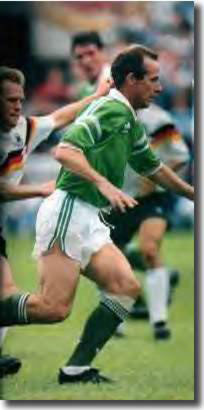 much
bother. Both games were won with 2-0 scorelines, and against the Hungarians
in particular, we played some good football.'
much
bother. Both games were won with 2-0 scorelines, and against the Hungarians
in particular, we played some good football.'
back to top
Before the rest of the games, Ireland had a friendly at home against
West Germany and Charlton used the game to look at three players who were
nearing the end of their careers, Liam Brady, Frank Stapleton and Tony
Galvin. A Stapleton goal put the Irish in front after 10 minutes, but
the Germans equalised before half-time and Brady was struggling. Charlton
pulled him off just before half-time and Brady reacted very badly. He
announced his international retirement after the game, which ended in
a 1-1 draw.
In their return match with Northern Ireland the team laboured, but eventually
ran out 3-0 winners. A 1-0 win in Malta followed and Ireland had qualified
for another set of major finals.
'Ireland's participation in Italia 90 would prove a lot of things to
a lot of people. Our performances in the European finals two years earlier
had made many of our peers sit up and take notice. Now we would show that
it was no flash in the pan - that we deserved to rank among the better
teams in the game.
'In Sardinia, just as we had done in Germany, we were to open our programme
against England - and then we would move to Sicily for the remaining first
phase games with Egypt and Holland.
'In my team talk, I went over the way England would play, the pattern
they would adopt and how we would cope with it. John Barnes and Chris
Waddle were still there, but the point which reassured me most was Bobby
Robson's choice of Bryan Robson and Paul Gascoigne in central midfield.
Bryan was one of the best midfielders England ever had, but they never
seemed to be able to find the right player to complement him. And that
was because he was so good at so many things. It would have been fine
if Bobby had left him to anchor midfield, but Bryan was also expected
to get forward and get the odd goal or two. And because of that dual responsibility,
it was never easy for them to find the right partner for him.
'Gascoigne certainly didn't meet that requirement. A strong runner and
a superb passer of the ball, he's at his best on the edge of the opposition's
box. At the other end of the pitch, he is a liability. He tries to be
too clever, aiming to nutmeg people or to pull the ball down, when a specialist
defender would just hoof it. I reckoned the more pressure we put on him,
the better.
'Neither Barnes nor Waddle was good defensively - Chris couldn't tackle
his own mother in a cupboard - and in that situation, I reckoned Bobby
didn't have enough ball-winners to prevent us getting at his back four.
As it turned out, I was right.
'We gave away a silly goal to Gary Lineker, but got no more than we deserved
when Kevin Sheedy equalised in the second half. After that, we were always
the more likely team, though we never managed another goal.
'The scoreless draw which followed against Egypt was notable from my
point of view for the fact that I got myself into trouble with the press
in both Cairo and Dublin. I lashed the Egyptians' attitude to the game
for the simple reason that I couldn't understand how players which had
battled their way through to the qualifying rounds could be so negative
when they arrived in the finals.'
A 1-1 draw with Holland in the final group game was enough to put both
sides through with England, who beat Egypt 1-0. The Irish and the Dutch
virtually settled on a draw when they heard England were winning.
'Conditions in Genoa for our quarter-final with Romania were absolutely
gruelling. The stadium was totally enclosed, there wasn't a breath of
air in the place, and with a capacity crowd ringing the pitch, the heat
was unbelievable. Both teams suffered, but I saw enough of the Romanians'
class in the opening twenty minutes to convince me they were a very dangerous
team.
'Gheorghe Hagi had a tremendous left foot, and twice almost scored before
we had settled. It was in moments like those that I was glad I had a player
like Packie Bonner in goal. We gradually got back into the game in the
second half, without ever breaking down a strong defence. It was all very
taut and tense.
'In extra-time, neither side threatened to score, for the simple reason
that they didn't have the energy to push on and look for a goal. Inevitably,
it went to a penalty shoot out, the first in the history of the competition.
The idea was so novel that I hadn't even taken the precaution of 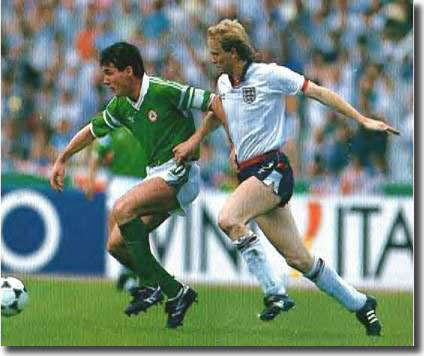 nominating
our penalty-takers in such an eventuality. That was laxness on my part
- but in reality, we knew who our best penalty-takers were.
nominating
our penalty-takers in such an eventuality. That was laxness on my part
- but in reality, we knew who our best penalty-takers were.
'John Aldridge, our penalty specialist, was out of the game at that stage.
I walked across to the players who were sat in the centre circle and asked,
"Who's going to take them?" Various hands went up, and the only
one that surprised me was David O'Leary, who had replaced Steve Staunton
in extra time. He said he'd have one, providing he was allowed to go last.
Fine.
'I was quite relaxed at that stage. We'd done well to reach this far.
Whatever happened now, nobody could say that we hadn't made our presence
felt. My only instruction was, "Make up your mind what you're going
to do and don't change it!"
'I was a bit annoyed with the referee. The instruction was that as the
players went to the penalty spot, they turned and showed him their number.
But on three or four occasions after our lads had placed the ball, he
beckoned them to him and made them turn around. He never did that with
the Romanians.
'Their keeper nearly got to Tony Cascarino's shot, but all kicks had
been successful when Daniel Timofte put the ball down for Romania's last
attempt. I've watched it on video a dozen times since, and it wasn't a
good penalty. It was struck at a comfortable height, and the only chance
he had of scoring was if Packie went the wrong way. But he didn't, and
after going close to stopping the previous one, Packie read the line perfectly.
'And so to O'Leary. I didn't know at that point that he had never previously
taken a penalty and it was just as well I didn't!
'I was now really uptight. I hadn't smoked for a couple of years, but
now I desperately needed a fag. So I turned and cadged one from an Italian
spectator, and then stuck my head through the wire for him to light it.
In the next day's papers there was a picture of me looking the other way
as David ran up to the ball, with the caption "Jack couldn't bear
to watch." Nonsense! Of course Jack could bear to watch - except
that with so many players stood in front of me, I thought it better to
look at the big video screen at the other end of the stadium.
back to top
'And then my nerve almost went. I put my hands over my face and said,
"No, I'm not watching this." But I pulled them away just in
time to see David send the goalkeeper the wrong way. Easy as winking!
And all of a sudden, the lads are running, all determined to pile themselves
on top of O'Leary and Bonner.
'We're through! For the first time, Ireland are within touching distance
of the World Cup. We're in the last eight, the last bloody eight! More
than that, we're headed for the biggest stage of all, a quarter-final
tie against Italy in the Olympic Stadium in Rome.
'Shortly after arriving in Rome, I discovered that our game was to be
refereed by a Portuguese official - and that worried me no end. I have
always been wary of match officials from that region. 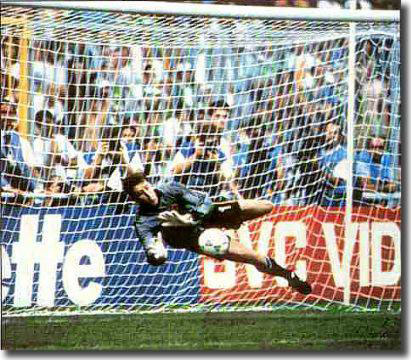 I'm
not saying they are out to stop you winning a game, but their interpretation
of the laws, as I discovered on trips abroad with Leeds, England and Ireland,
is vastly different to the rest of the world.
I'm
not saying they are out to stop you winning a game, but their interpretation
of the laws, as I discovered on trips abroad with Leeds, England and Ireland,
is vastly different to the rest of the world.
'If you raise a boot five inches, they whistle. If you jump with an opponent,
they whistle. If there is any kind of physical contact whatever, they
whistle. And since our game plan was based in part on hustling and pressurising
opponents, it didn't augur well for our prospects in the Olympic Stadium.
'And this was no ordinary Portuguese official. He was none other than
Silva Valente, the man who had caused me to stand principle on its head
and to have a go at him, publicly, in that European Championship game
in Bulgaria a couple of years earlier.
'Two diabolical decisions that day had cost us the game - and while he
didn't do anything quite as drastic in Rome, he was certainly no help.
Every time we got a bit of momentum going, he would stop the game for
one reason or another. But they were always thirty or forty yards out.
We had difficulty getting anywhere near their goal.
'Toto Schillaci's goal hurt in more ways than one. It was a bloody stupid
score to concede, coming directly as a result of Kevin Sheedy playing
a silly ball to John Aldridge. In our match plan, we gave the ball into
the corner for the runner, but this time, strangely, John showed for it
and Kevin played it to his feet.
'That was inviting trouble, and sure enough, we got it. The Italians
swept the ball three-quarters the length of the pitch in the twinkling
of an eye, and when Packie could only parry Roberto Donadoni's shot, Schillaci
stuck the rebound in the net.
'We were out of the World Cup, the dream was over - and all because of
one lapse of concentration. We had done better than anybody could reasonably
have expected ... and yet the thought persisted that it could have been
even better.' In the qualifying rounds for the 1992 European Championships,
Ireland kicked off with a home game against Turkey, which they duly won
5-0, but this was deceptive.
'Our next two games were against England, home and away, and we twice
let them off the hook, allowing them to escape with 1-1 draws when we
should have won both matches easily. Ray Houghton missed a sitter in the
Dublin game - and, incredibly, did the same thing again when we went to
London, for a fixture which brought out Wembley's biggest crowd in years.
'We had started badly, with Steve Staunton deflecting Lee Dixon's shot
past Packie Bonner, but then proceeded to give them a lesson in our pressure
game. For the best part of ten minutes, we pinned them in the top third
of the pitch. I heard Graham Taylor roar at his players, 'Get out, get
out.' But we had them ringed so tight that they couldn't get out. In ten
years, that was the single best illustration of our ability to pressurise
opponents.
'Eventually, Niall Quinn knocked in the equaliser from Paul McGrath's
cross, but that was the very least we deserved to take out of the game.
I mean, if we'd won 3-1 nobody, not even the most dyed-in-the-wool England
supporter, could have complained about the scoreline.
'But Kevin Sheedy on his wrong foot missed from no more than a couple
of yards, before Houghton compounded it all in the last few minutes by
shooting just past David Seaman's left-hand post when it looked so much
easier to bury it in the net. That was typical of Ray, a brilliant player
around the pitch, but not the most reliable when it came to finishing.
And I remember saying to them at the end of the game, "That's the
chance which could cost us a place in the European finals." Never
did I speak truer words.
'By the time we got to our last two games in Poland and Turkey, it was
tight, desperately tight, as to 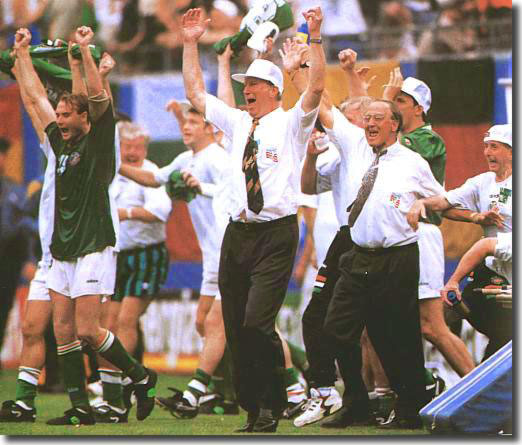 whether
England or ourselves would get the one qualifying place on offer in the
group. For the Polish game in Posnan, I decided to change tack. Instead
of going with two front players, I played a fifth midfielder. The plan
was for Roy Keane and Andy Townsend to run at the Poles from deep positions
and get on the end of crosses from our full backs.
whether
England or ourselves would get the one qualifying place on offer in the
group. For the Polish game in Posnan, I decided to change tack. Instead
of going with two front players, I played a fifth midfielder. The plan
was for Roy Keane and Andy Townsend to run at the Poles from deep positions
and get on the end of crosses from our full backs.
'For more than an hour it worked brilliantly. Time after time, we punched
holes in their defence, and with twenty minutes to go, we led 3-1. But
then came the miscalculation. Frankly, I hadn't reckoned on how much our
running game would take out of our players, and with our midfielders forced
backwards to the point where they finished up on top of our defenders,
the Poles got in for two late goals to save a point.
'To qualify, we needed to beat Turkey in Istanbul and then depend on
the Poles doing us a favour at the same time against Graham Taylor's team.
And boy, did we give it a whirl! I had always found Turkey a difficult
country to play in every time I went there. The spectators are very hostile.
To win a game, you always had the impression that you had to beat the
crowd as well as the Turkish team.
back to top
'It quickly became apparent that this would be a test of character as
much as skill, and the lads responded magnificently. John Byrne, back
in the side after a long absence, gave us an early lead, and while they
equalised from a doubtful penalty, we quickly got back on top again to
win with further goals from Byrne and Tony Cascarino. Great! And the word
from Poland was even better. England are losing 1-0. If it stays like
that, we're on our way to Sweden for the finals the following summer.
'As I'm walking off the pitch at the end, the Turkish manager, Sepp Piontek,
an old friend of mine, comes across to congratulate me. He says that Poland
have won in Posnan.
'I can't wait to get inside to congratulate the lads, when suddenly,
out of the corner of my eye, I catch a glimpse of Mick McCarthy. His face
is about three feet long. "What's wrong, Mick?" I ask. "You
haven't heard, then," he says sadly. "Gary Lineker has just
gone and scored for England - we're out."
'In the space of not more than ninety seconds, I had gone from the summit
all the way down to the valley, and the experience was awful. We haven't
lost a game in the competition, we've squandered a hatful of chances along
the way and now, we miss out on the finals by six or seven minutes!'
Soon after that disappointment, 1994 World Cup qualifying began and Ireland
faced Denmark , Spain, Northern Ireland, Latvia and Lithuania. Ireland
beat Latvia in their first game and then faced the Danes. The game in
Copenhagen ended in a scoreless draw, which was also the score when Ireland
visited Spain in Seville the following month.
'Nobody had ever gone there and beaten Spain in a big game, but I tell
you something, we came pretty close to it that night. Late in the game,
John Aldridge chested the ball past their centre back, took it around
the keeper and put it into the empty net. To everybody in the stadium,
it was a perfectly good goal. I couldn't believe what I was seeing when
a linesman stuck up his flag for offside.
'It was a disappointing result on the night, but with two vital away
points to go with the win in Latvia, I was reasonably content on the journey
home.
'A 3-0 win over Northern Ireland in Dublin could have been doubled had
we not stopped playing in the second half, and while a 1-1 draw in the
return meeting with Denmark at Lansdowne Road was disappointing, I still
thought we were in good shape facing up to our summer programme in eastern
Europe.
'After a nightmare stay and a friendly win in Albania, we banked six
important points by winning 2-0 in Riga and beating Lithuania 1-0 in Vilnius
the following week.
'By the time we got to our second last game, against Spain in Dublin,
we knew exactly what we had to do to qualify. A win over the Spaniards
would be enough to put us out of the reach of the rest and spare us the
need to get a good result against Northern Ireland in Belfast the following
month.
'Spain had never been the best of travellers in international football,
but they caught fire in the rain that day and simply destroyed us. They
were a goal up after just twelve minutes, scored a second time when Alan
Kernaghan got himself into trouble by refusing to do the simple thing
in a tussle with Julio Salinas - and when Salinas scored again before
half-time, there was just no way back.'
John Sheridan pulled a goal back in the second half to steady things,
but Ireland now needed to beat Northern Ireland to make certain of going
to America for the finals. A draw could still result in qualification
on goal difference, but only if Spain beat Denmark in the other game.
back to top
A 1-1 draw gained by a goal from sub Alan McLoughlin after a 25-yard
volley from Jimmy Quinn took the lead was enough when Spain beat Denmark
1-0 in the other game.
In the weeks before the 1994 World Cup finals in America, Ireland went
on to win 1-0 in Holland and then 2-0 in Germany in their last game before
the finals. The World Cup finals themselves were marked by blistering
heat and conditions which did not favour the Irish. Strict conditions
around refreshments also led to some problems. On the day of their first
game against Italy in New Jersey, it was well into the nineties.
'By any standard, it was a remarkable game. For one thing, the setting
was like nothing else I'd ever experienced. It's not often the Italians
are outnumbered in New York, but take it from me, this was one of them.
I mean, there must have been 40,000 Irish people form all over the world
in the stadium, and hell, did they make their presence felt! It was carnival
time all the way, and, of course, we got the result we wanted.
'The game had only been on for ten or twelve minutes when Ray Houghton
pulled down a bad clearance by Francesco Baresi, and from the edge of
the box chipped the goalkeeper, sweet as a nut. Six years earlier, I had
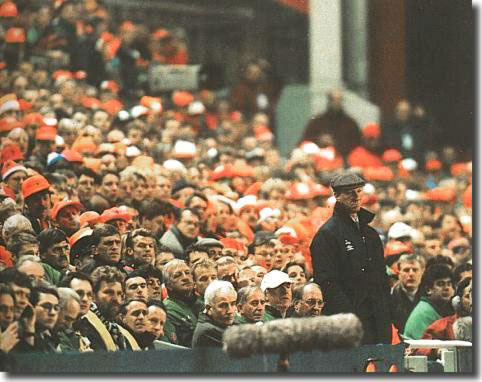 seen
Ray produce another crucial goal against England at roughly the same stage
of the game, and I remembered how we had sat and suffered for the remainder
of the match, minute by agonising minute. But not this time.
seen
Ray produce another crucial goal against England at roughly the same stage
of the game, and I remembered how we had sat and suffered for the remainder
of the match, minute by agonising minute. But not this time.
'From there on, we gave every bit as good as we got, and should have
had a second goal when John Sheridan, taking a superb pass from Roy Keane,
thumped the ball against the crossbar. Bloody great stuff. Out there playing
us was one of the most respected teams in the world - and yet we handled
them comfortably. Paul McGrath was magnificent; Roy Keane and Andy Townsend
got among the Italians in midfield; and up front, Tommy Coyne was bravery
itself.'
back to top
The next game was against Mexico and the conditions were just as oppressive.
Ireland started well enough, but gradually wilted as the Mexicans got
on top and established a 2-0 lead. There was also enormous controversy
when the officials prevented John Aldridge coming on as substitute for
what seemed an age, leaving Ireland with only ten men. When he did get
on he pulled a goal back, which meant that a draw in the next game against
Norway would be good enough to see them through.
Ireland managed that draw quite effectively, which set up a game in the
last sixteen with Holland in Orlando.
'In spite of the fact that we had beaten Holland in Tilburg just a couple
of months earlier. I was wary of the Dutch. They had a lot of good players
who could turn it on, and we needed to be very careful about letting them
get at our back four.
'Still, they caused us no problems at all, until a silly mistake by Terry
Phelan turned the whole competition sour for us. Terry had ample time
to knock the ball away, but instead he let it bounce and then, from a
distance of twenty five yards or more, attempted to head back in the direction
of Packie Bonner. There was never enough pace on the ball to enable him
to do that, and Marc Overmars, reading the situation perfectly was away
and running. Phil Babb and Paul McGrath had been caught square by Phelan's
gaffe, and when Overmars crossed, Dennis Bergkamap had a simple job in
sliding in the first goal.
'Crass carelessness had cost us a vital score, but if that was bad, even
worse was to follow. There were at least five Irish players between Wim
Jonk and the goal when he let one go from all of thirty yards. Whether
Packie misread the line of the shot, or whether the ball swerved in the
air, I'll never know. But instead of making the straightforward save,
he allowed the ball to clip the top of his fingers, and it dropped ever
so gently over the line for a second and clinching goal.'
So Ireland were out and there was a massive sense of anti-climax. They
had achieved probably as much as they were expected to do, but it still
felt very disappointing.
It was about then that Jack decided to quit.
'When Holland put us out of the European Championships in a play off
at Anfield in November 1995, I knew that it was the time for me to say
goodbye. The question was when, and because of the uncertainty - partly,
I have to say, of my own making - I ended up in a situation in which for
the first time in almost ten years, I had aggro with the Football Association
of Ireland.
'It should never have come to that. For one thing, we should have qualified
for the European finals. Halfway through our qualifying programme, I was
absolutely certain that we would. But then we lost a couple of key players
at vital times, and for a small outfit like ours that was ruinous. Ever
since I took the job, I'd staked my reputation on building a squad in
which I had at least one viable option in all eleven positions in the
team. I prided myself on the fact that despite limited resources, we had
achieved that.
'But then we lost players like Roy Keane, Andy Townsend, John Sheridan
and Steve Staunton. From a position in which we were coasting through
our programme, I watched the old confidence disappear before my eyes.
After losing three of our last four matches, I sensed that the show was
almost over as we got ready to go to Liverpool for the meeting with the
Dutch.'
And that was that. Ireland lost out to a Patrick Kluivert goal and Jack
resigned on 21 January 1996, just short of ten wonderful years from the
date he took on the task of making Ireland, for a while at least, one
of the best international sides in the world.
Part 1 The early years - Part
2 1966 and all that - Part 3 Indian summer
- Part 4 Football manager
back to top











 Part 1 The early years - Part
2 1966 and all that - Part 3 Indian summer
- Part 4 Football manager
Part 1 The early years - Part
2 1966 and all that - Part 3 Indian summer
- Part 4 Football manager with
the primary aim of getting their playmaker free.
with
the primary aim of getting their playmaker free. in Mexico two years earlier and, as such, Germany was no big deal for
them.
in Mexico two years earlier and, as such, Germany was no big deal for
them. Paul
McGrath fit for action again, I was pretty confident we'd get it. That
was until we got to the stadium on match day and discovered that the temperature
was in the high nineties for the afternoon kick-off.
Paul
McGrath fit for action again, I was pretty confident we'd get it. That
was until we got to the stadium on match day and discovered that the temperature
was in the high nineties for the afternoon kick-off. much
bother. Both games were won with 2-0 scorelines, and against the Hungarians
in particular, we played some good football.'
much
bother. Both games were won with 2-0 scorelines, and against the Hungarians
in particular, we played some good football.' nominating
our penalty-takers in such an eventuality. That was laxness on my part
- but in reality, we knew who our best penalty-takers were.
nominating
our penalty-takers in such an eventuality. That was laxness on my part
- but in reality, we knew who our best penalty-takers were. I'm
not saying they are out to stop you winning a game, but their interpretation
of the laws, as I discovered on trips abroad with Leeds, England and Ireland,
is vastly different to the rest of the world.
I'm
not saying they are out to stop you winning a game, but their interpretation
of the laws, as I discovered on trips abroad with Leeds, England and Ireland,
is vastly different to the rest of the world. whether
England or ourselves would get the one qualifying place on offer in the
group. For the Polish game in Posnan, I decided to change tack. Instead
of going with two front players, I played a fifth midfielder. The plan
was for Roy Keane and Andy Townsend to run at the Poles from deep positions
and get on the end of crosses from our full backs.
whether
England or ourselves would get the one qualifying place on offer in the
group. For the Polish game in Posnan, I decided to change tack. Instead
of going with two front players, I played a fifth midfielder. The plan
was for Roy Keane and Andy Townsend to run at the Poles from deep positions
and get on the end of crosses from our full backs. seen
Ray produce another crucial goal against England at roughly the same stage
of the game, and I remembered how we had sat and suffered for the remainder
of the match, minute by agonising minute. But not this time.
seen
Ray produce another crucial goal against England at roughly the same stage
of the game, and I remembered how we had sat and suffered for the remainder
of the match, minute by agonising minute. But not this time.